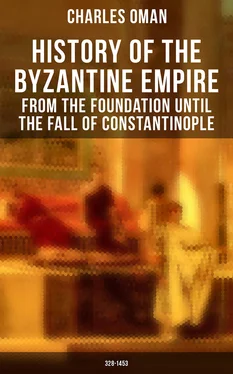The Megarians, almost more than any other Greeks, devoted their attention to the Euxine, and the foundation of Byzantium was but one of their many achievements. Already, seventeen years before Byzantium came into being, another band of Megarian colonists had established themselves at Chalcedon, on the opposite Asiatic shore of the Bosphorus. The settlers who were destined to found the greater city applied to the oracle of Delphi to give them advice as to the site of their new home, and Apollo, we are told, bade them “build their town over against the city of the blind.” They therefore pitched upon the headland by the Golden Horn, reasoning that the Chalcedonians were truly blind to have neglected the more eligible site on the Thracian shore, in order to found a colony on the far less inviting Bithynian side of the strait.
 Early Coin Of Byzantium.
Early Coin Of Byzantium.
 Late Coin Of Byzantium Showing Crescent And Star.
Late Coin Of Byzantium Showing Crescent And Star.
From the first its situation marked out Byzantium as destined for a great future. Alike from the military and from the commercial point of view no city could have been better placed. Looking out from the easternmost headland of Thrace, with all Europe behind it and all Asia before, it was equally well suited to be the frontier fortress to defend the border of the one, or the basis of operations for an invasion from the other. As fortresses went in those early days it was almost impregnable—two sides protected by the water, the third by a strong wall not commanded by any neighbouring heights. In all its early history Byzantium never fell by storm: famine or treachery accounted for the few occasions on which it fell into the hands of an enemy. In its commercial aspect the place was even more favourably situated. It completely commanded the whole Black Sea trade: every vessel that went forth from Greece or Ionia to traffic with Scythia or Colchis, the lands by the Danube mouth or the shores of the Maeotic Lake, had to pass close under its walls, so that the prosperity of a hundred Hellenic towns on the Euxine was always at the mercy of the masters of Byzantium. The Greek loved short stages and frequent stoppages, and as a half-way house alone Byzantium would have been prosperous: but it had also a flourishing local trade of its own with the tribes of the neighbouring Thracian inland, and drew much profit from its fisheries: so much so that the city badge—its coat of arms as we should call it—comprised a tunny-fish as well as the famous ox whose form alluded to the legend of the naming of the Bosphorus.1
As an independent state Byzantium had a long and eventful history. For thirty years it was in the hands of the kings of Persia, but with that short exception it maintained its freedom during the first three hundred years that followed its foundation. Many stirring scenes took place beneath its walls: it was close to them that the great Darius threw across the Bosphorus his bridge of boats, which served as a model for the more famous structure on which his son Xerxes crossed the Hellespont. Fifteen years later, when Byzantium in common with all its neighbours made an ineffectual attempt to throw off the Persian yoke, in the rising called the “Ionic Revolt,” it was held for a time by the arch-rebel Histiaeus, who—as much to enrich himself as to pay his seamen—invented strait dues. He forced every ship passing up or down the Bosphorus to pay a heavy toll, and won no small unpopularity thereby for the cause of freedom which he professed to champion. Ere long Byzantium fell back again into the hands of Persia, but she was finally freed from the Oriental yoke seventeen years later, when the victorious Greeks, fresh from the triumph of Salamis and Mycale, sailed up to her walls and after a long leaguer starved out the obstinate garrison [b.c. 479]. The fleet wintered there, and it was at Byzantium that the first foundations of the naval empire of Athens were laid, when all the Greek states of Asia placed their ships at the disposal of the Athenian admirals Cimon and Aristeides.
During the fifth century Byzantium twice declared war on Athens, now the mistress of the seas, and on each occasion fell into the hands of the enemy—once by voluntary surrender in 439 b.c., once by treachery from within, in 408 b.c. But the Athenians, except in one or two disgraceful cases, did not deal hardly with their conquered enemies, and the Byzantines escaped anything harder than the payment of a heavy war indemnity. In a few years their commercial gains repaired all the losses of war, and the state was itself again.
We know comparatively little about the internal history of these early centuries of the life of Byzantium. Some odd fragments of information survive here and there: we know, for example, that they used iron instead of copper for small money, a peculiarity shared by no other ancient state save Sparta. Their alphabet rejoiced in an abnormally shaped Β, which puzzled all other Greeks, for it resembled a Π with an extra limb.2 The chief gods of the city were those that we might have expected—Poseidon the ruler of the sea, whose blessing gave Byzantium its chief wealth; and Demeter, the goddess who presided over the Thracian and Scythian corn lands which formed its second source of prosperity.
The Byzantines were, if ancient chroniclers tell us the truth, a luxurious as well as a busy race: they spent too much time in their numerous inns, where the excellent wines of Maronea and other neighbouring places offered great temptations. They were gluttons too as well as tipplers: on one occasion, we are assured, the whole civic militia struck work in the height of a siege, till their commander consented to allow restaurants to be erected at convenient distances round the ramparts. One comic writer informs us that the Byzantines were eating young tunny-fish—their favourite dish—so constantly, that their whole bodies had become well-nigh gelatinous, and it was thought they might melt if exposed to too great heat! Probably these tales are the scandals of neighbours who envied Byzantine prosperity, for it is at any rate certain that the city showed all through its history great energy and love of independence, and never shrank from war as we should have expected a nation of epicures to do.
It was not till the rise of Philip of Macedon and his greater son Alexander that Byzantium fell for the fifth time into the hands of an enemy. The elder king was repulsed from the city's walls after a long siege, culminating in an attempt at an escalade by night, which was frustrated owing to the sudden appearance of a light in heaven, which revealed the advancing enemy and was taken by the Byzantines as a token of special divine aid [b.c. 339]. In commemoration of it they assumed as one of their civic badges the blazing crescent and star, which has descended to our own days and is still used as an emblem by the present owners of the city—the Ottoman Sultans. But after repulsing Philip the Byzantines had to submit some years later to Alexander. They formed under him part of the enormous Macedonian empire, and passed on his decease through the hands of his successors—Demetrius Poliorcetes, and Lysimachus. After the death of the latter in battle, however, they recovered a precarious freedom, and were again an independent community for a hundred years, till the power of Rome invaded the regions of Thrace and the Hellespont.
Byzantium was one of the cities which took the wise course of making an early alliance with the Romans, and obtained good and easy terms in consequence. During the wars of Rome with Macedon and Antiochus the Great it proved such a faithful assistant that the Senate gave it the status of a civitas libera et foederata , “a free and confederate city,” and it was not taken under direct Roman government, but allowed complete liberty in everything save the control of its foreign relations and the payment of a tribute to Rome. It was not till the Roman Republic had long passed away, that the Emperor Vespasian stripped it of these privileges, and threw it into the province of Thrace, to exist for the future as an ordinary provincial town [a.d. 73].
Читать дальше

 Early Coin Of Byzantium.
Early Coin Of Byzantium. Late Coin Of Byzantium Showing Crescent And Star.
Late Coin Of Byzantium Showing Crescent And Star.










